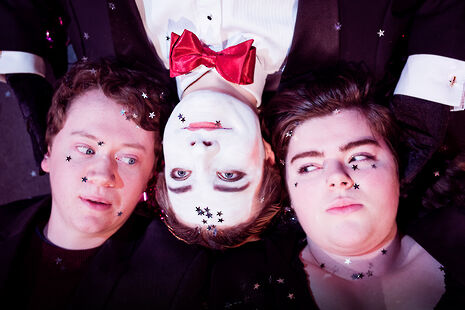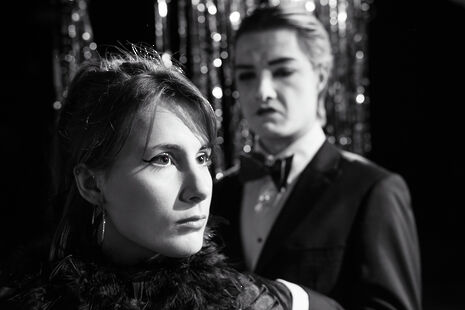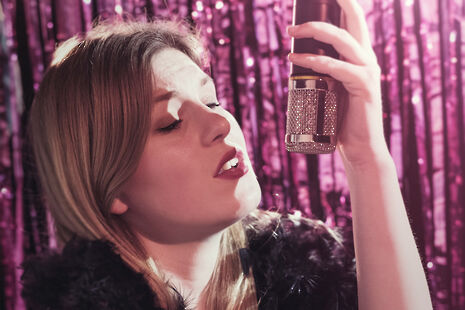Review: Cabaret
“A must-see for this year” and “blisteringly entrertaining” writes Olivia GIllman, impressed with this immersive re-imagining of Kander and Ebb’s Cabaret

“What use is sitting alone in your room...[when all you’re doing there is creating echo chambers on Facebook, and hiding from the cataclysmic demise of the liberal West]?”
“Come hear the music play” in Myles O’Gorman’s Cabaret, where 1931 Berlin serves as a stark reminder of a society’s descent into fascism. Kander and Ebb’s 1966 Broadway Musical may have seemed like a traditional echo of a distant past as little as five years ago (its last staging in Cambridge), but set against current world events, in 2017, this becomes fresh and politically potent material. O’Gorman’s production is witty, innovative, and appropriately stressful. It delivers a striking theatrical punch that, while not always fully polished, thrusts to the heart of contemporary anxieties with sumptuous rawness.
Two things from this evening particularly stand out. The first is O’Gorman’s carefully orchestrated style, portraying a startling paradox in a warmly uncomfortable Kit Kat Club, where the threat of Nazi invasion is imminent, but wall-to-wall joyous debauchery distracts its inhabitants. In the secret venue, pillars and exposed brickwork combine with a curved ceiling and long tunnelling room to frame a stage picture evocative of a multi-layered Victorian paper toy puppet theatre.

In one memorable vignette, a warmly lit American writer, Cliff Bradshaw (Joe Sefton), occupies a table and chair area immersed in the audience. Rounded glasses perched on his nose, he hovers with commanding presence over his typewriter. All at once believable and cartoon-like, sitting with a rosy cheeked charisma and a great blue trench, Sefton is like an illustrated bohemian puppet cast into the space on a cardboard strip by an emcee puppeteer.
“It delivers a striking theatrical punch that, while not always fully polished, thrusts to the heart of contemporary anxieties with sumptuous rawness”
A metre or so further behind him is staggered Herr Schultz (Dan Allum-Gruselle). He stands on a bare stage backgrounded by a purple curtain. With a charm evocative of a music hall clown, and twentieth-century greats such as Laurel, Hardy, or Norman Wisdom (Allum-Gruselle, considering his talent, is bizarrely under-used on the Cambridge comedy scene), he sings about his love of pineapples. This is a welcomely cheeky motif, milked to bring flashes of light to the darkness of the work. Memorable too is his dash into the crowd to deliver “GOOD NEWS!” – particularly poignant as set against the tragedies his character later endures.
Vivid, cartoon-like aesthetics are toyed with further in the employment of a sheet held at the back of the stage in one scene, simply reading: “window”, before it is ripped, or smashed, down by the Emcee. The theme of play also carries to Claire Sosienski Smith’s lighting design, where stark white bulbs flash at performers as flood lights cast by torturers preparing to capture victims – or photographers seeking to capture local celebrities.
Raucous fun is had in some astutely exercised actor interaction with audience members and long scarves. The entertainment O’Gorman teases out of these scenes typifies odd moments in the production that wouldn’t look out of place on Broadway. These tend to be with a small concentration of actors on the stage-surfacing most notably in Sally Bowles' (Holly Musgrave) and Cliff’s slick vocals during the song ‘Perfectly Marvellous.’ There is also the hilarity of The Emcee (Seth Kruger)’s ‘Two Ladies’ with two chorus members (Anastasia Raymond and Nina Vinther) whose professionalism and comic timing is consistently good.

The second major stand out element of the production is its finale. I wish not to give spoilers, but will say that it will be different to anything you’ve experienced in a more analogue Cambridge production. I have never felt a tension take a room with such horrifying and enthralling force. This is Jasmin Rees’s moment of the production, as Ernst Ludwig’s presence, humorous to this point, ricochets around the space with a consuming authority. Seth Kruger’s Emcee follows on from, but does not plagiarise, Joel Grey and Alan Cummings’s infamous depictions – and is utterly haunting. Like a Puck who has just absorbed the horrors of Mein Kampf, he goes for an ethereal, conniving stillness. Across his optimistic eyes lightly dance the horrors of 1930s Germany – and the gaze of the audience is unable to leave him to suffer in silence.
“I wish not to give spoilers, but will say that it will be different to anything you’ve experienced in a more analogue Cambridge production”
The rich textures of Francesca Bertoletti’s vocals should not go overlooked, although it was a shame not to see more made of her hair, make up and costume to suggest her more mature, landlady character, especially as she leads vast sections of the show. It would have been interesting, too, to see some more done with the Fosse choreography more traditionally associated with the show. To this end, the chorus was also prone to losing uniformity sometimes and parts of the movement came off as quite under-choreographed. The deliverance of audience members from church pick-up point to venue could also have been orchestrated with a more cunning or bashful secrecy, for a truly optimised and immersive experience.
Flashes of acting, while often intentionally pantomime, could also become a little lack lustre, with German accents sometimes taking on more of an RP tone. Slightly jarringly, there was also a ‘Make America Great Again’ reference which seemed a little too anachronistically “dot to dot: these are our themes” in a production that, while consistently toying with metaphor, otherwise kept a more exclusively close relationship with the early twentieth century.
However, these were all small kinks in an awesome show that will tighten as it evolves through the week. In its innovative formatting, a piece that could risk being labelled ‘gimmicky’ is anything but. This is a must-see for this year. Traditional musical theatre for today, and our futures in an increasingly uncertain world. O’Gorman’s team have assembled a blisteringly entertaining Cabaret
 News / Judge Business School advisor resigns over Epstein and Andrew links18 February 2026
News / Judge Business School advisor resigns over Epstein and Andrew links18 February 2026 News / Gov grants £36m to Cambridge supercomputer17 February 2026
News / Gov grants £36m to Cambridge supercomputer17 February 2026 News / CUCA members attend Reform rally in London20 February 2026
News / CUCA members attend Reform rally in London20 February 2026 News / Union speakers condemn ‘hateful’ Katie Hopkins speech14 February 2026
News / Union speakers condemn ‘hateful’ Katie Hopkins speech14 February 2026 News / Hundreds of Cambridge academics demand vote on fate of vet course20 February 2026
News / Hundreds of Cambridge academics demand vote on fate of vet course20 February 2026









